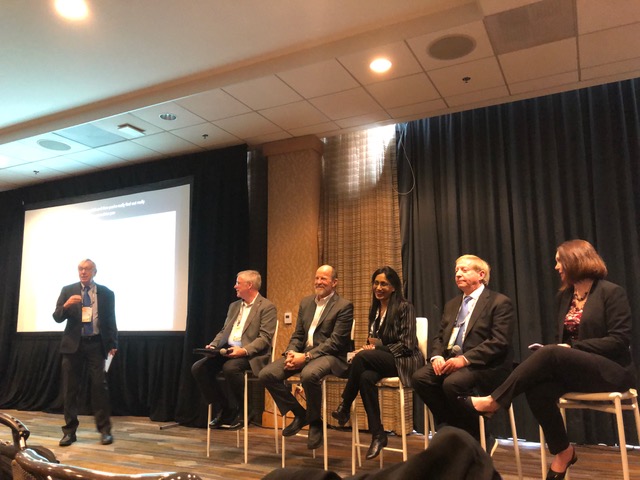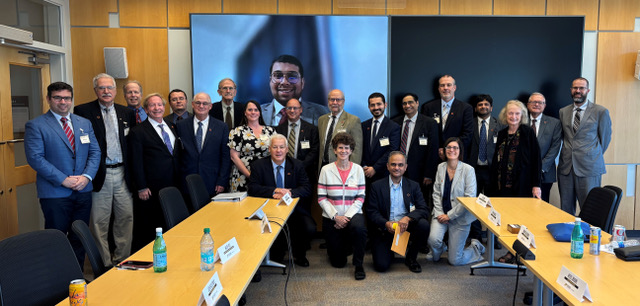
Howard Appelman, chair-elect of ABET’s Industry Advisory Council (IAC)
When Howard Appelman retired from Boeing in 2024 after 42 years, he wasn’t ready to step away from engineering altogether. Instead, he turned toward the classroom — teaching design courses in mechanical and aerospace engineering at Missouri University of Science and Technology — and toward ABET, where he now helps shape the future of engineering education as chair-elect of ABET’s Industry Advisory Council (IAC).
For Appelman, serving with the IAC reflects the power of industry partnership in education and is a natural extension of a lifelong commitment to both engineering excellence and workforce readiness. “When you graduate from an ABET-accredited program, you know there’s a certain level of quality there,” he said. “The students are well-prepared for the workforce, and that’s something we relied on for decades when hiring at Boeing.”
Keeping Pace with Change
Appelman believes one of ABET’s greatest strengths lies in its ability to adapt educational standards in response to the rapid pace of technological change. “The IAC plays a big role in making sure the industry perspective is represented in how criteria are developed,” he explained. “Continuous improvement is built into ABET’s process; it’s not static. What worked 10 or 20 years ago isn’t enough anymore.”
That industry-informed feedback loop, he said, ensures that science, technology, engineering and math (STEM) programs evolve alongside emerging technologies and expectations — a vital part of sustaining workforce readiness in a rapidly changing landscape. “As industry participants, we can help programs stay aligned with the skills that are actually in demand,” Appelman noted. “For example, the explosion of AI has created huge demand for specific competencies. If more industry professionals engage with ABET, we can help ensure students are learning the right things, not just for today, but for five years from now.”
Teaching, Applying and Advancing Workforce Readiness Through ABET
Appelman’s dual perspective, as both an industry veteran and educator, reflects the strength of ABET and industry collaboration, giving him firsthand insight into how program criteria translate into classroom practice. “Through my work with ABET, I’ve updated my own course syllabi to better align learning objectives and assessments,” he said. “It really helps you see how the process is meant to work: ensuring students aren’t just learning theory, but developing skills they can apply, which is essential to workforce readiness.”
He’s also passionate about how accreditation through ABET helps attract talent to the field. “It’s a signal of quality not only to employers, but also to high school students deciding where to study,” Appelman said. “If a program is ABET-accredited, students know it’s aligned with real-world needs and sets them up for professional licensure and long-term success, reinforcing career readiness through accreditation.”
Encouraging Industry Involvement

Howard Appleman participates in Lifelong Learning Panel organized by the IAC at the 2025 ABET Symposium.
As he steps into his new leadership role on the IAC, Appelman hopes to inspire more professionals from industry to get involved with ABET, supporting industry-driven STEM education through advisory boards, program evaluations, or council participation. “There’s a real shortage of engineers, and industry has a stake in making sure graduates have the right skills,” he said. “By engaging with ABET, we can help shape curricula, attract more young people to STEM, and strengthen the future workforce.” Appelman encourages others to consider volunteering with ABET as a meaningful way to give back and help shape the future workforce.
He also sees a role for the IAC in helping educators navigate the rise of AI and other transformative technologies, where industry experts in education can provide valuable perspective on integrating new tools responsibly. “We want students who can think critically and innovate,” he said. “The challenge is to ensure tools like AI are used to enhance those abilities, not replace them.”
Looking Ahead
As chair-elect for 2025–2026, Appelman will help guide the IAC’s efforts to deepen collaboration between academia and industry, ensuring that ABET continues to be the global leader in quality assurance for STEM education and preparing students for the workforce. Through efforts like these, ABET continues to demonstrate the strong link between accreditation and employability, ensuring graduates are prepared for an evolving global workforce. “Our goal is to keep engineering education forward-looking,” he said. “The better we can align what’s taught in classrooms with what’s needed in the field, the stronger our profession and the greater our workforce readiness will be.”
